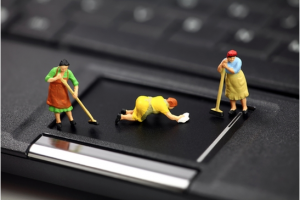
Change Passwords
Look over your passwords and change them if it’s been awhile. Remember that the more complicated and lengthy a password is, the more difficult it will be for an unscrupulous hacker to replicate it. Passwords should contain both letters and numbers.
Don’t Use Family Data For Passwords
Avoid using kids’ birthdates or names or any other reference to family data. Remember the hackers regularly troll for such connections. People still are tempted to use obvious combinations such as Password123, but that’s just making it easy for the hackers. Update software and examine your personal information on devices and online. Passwords, even the tough ones, should be changed every few months. Recycling an old one may seem an easy solution, but the longer it has been around, the easier it will be for the crooks to find it.
Use Different Passwords For Important Accounts
Don’t use the same password for routine family business, such as school sites, etc., as you use for your banking account. Multiple-factor identification that require a second form such as a code texted to your phone, gives extra protection. If it seems that all this is getting too complicated, consider a password management service such as LastPass or DashLane.
Back Up Your Information
Ransomware is one of the latest ploys hackers use. If they are able to lock down your computer, they will threaten to wipe your data unless you pay them not to. The problem often arises from malicious software resulting from clicking on a link in a phishing email or through fake online ads. For a monthly fee, you can back up your data through services such as Carbonite. Mac and Windows PCs have tools for backing up to external drives. The Mac version is Time Machine. Windows 10 has Update & Security and Windows 7 Systems and Security or System and Maintenance. Unplug the drive after each backup to prevent malware creeping into the copies.
Keep Software Up To Date
New versions fix flaws that give hackers entry into your device. This applies not only to operating systems, but to apps such as browsers and media players. Most software now comes with auto-updating features. Get rid of software you aren’t using any longer. Don’t forget your wireless router and the assorted “Internet of things” devices, Consult the manufacturers’ website if you have older equipment that doesn’t automatically update or allow you to do it through a phone app.
Restrict Social Media Accounts
Lock down social media accounts by restricting posts to actual friends. But even if you restrict your audience, just assume that what you are posting will be seen by everyone everywhere. For one thing, employers may be checking Facebook or Twitter for information about a potential employee. Don’t be embarrassed by what you have posted.



